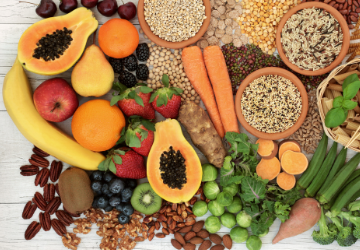
Posted by
Digestion plays a crucial role in our health and wellbeing, yet most of us don't think much about it. Digestion is the process of breaking down food into nutrients, that our body needs in order to function well. Without a well-functioning digestive system, you would be unable to absorb vital nutrients from your food. Not only that, but poor digestion can lead to uncomfortable digestive symptoms like gas, bloating, constipation, diarrhoea, and in chronic cases, nutrient deficiencies.
The digestive system comprises the gastrointestinal tract, which includes the mouth, oesophagus, stomach and small intestine, large intestine and rectum.
From our mouth, saliva is produced when we see, smell and taste food. We break down our food into smaller pieces by using our teeth to chew it. At the same time the enzyme Amylase, found in our saliva, starts to digest starch or carbohydrate molecules. When we swallow these, the smaller digested particles travel down our oesophagus to enter the stomach.
The stomach secretes Hydrochloric acid (HCL), which has many functions, including activating the enzyme pepsin, which as the name suggests, breaks down protein. HCL has a very low pH which assists in destroying germs that are ingested with food. HCL and the stomach mucus also protects our stomach from pepsin, and the pepsin digesting our stomach instead and causing mucosal damage as it is such a powerful enzyme.
Our stomach muscles contract and assist in mixing the food particles with gastric juices – think of a washing machine mixing up your clothes with detergent, ensuring they are thoroughly mixed. From there, the particles move onto our small intestines.
Within the small intestine, we receive a bicarbonate buffer produced from our pancreas to reduce the acidity of our food mixed with HCL from our stomach. Once neutralised, both the pancreas and liver release digestive enzymes and bile to help break down starches (from our carbohydrates), sugars, fats and protein peptides.
Like the stomach, our muscles contract in the small intestines to mix the particles with the enzymes and bile. The muscles also help move the particles through the small intestine so that they can be absorbed. The digested food gets absorbed into our bloodstream, and the blood carries the nutrients throughout the body. Any food that is not absorbed or broken-down moves into the large intestines and eventually becomes a waste product such as our faecal matter.
The large intestines absorb water and any remaining nutrients before finally eliminating is as waste.
Take your time to chew your food thoroughly to slowly help break down your food as much as possible before it enters the stomach. Some people find that eating too quickly or not chewing enough can cause bloating or more gas than normal.
We live in a world where the fight-or-flight is almost a constant reality. Whether it be work stress, balancing a social life, or taking care of our family and loved ones, we are often on the go and rarely ever told to relax and enjoy. A symptom of this lifestyle is sustained activation of the sympathetic nervous system (SNS). The SNS is responsible for releasing norepinephrine and epinephrine into the bloodstream, which boosts heart rate to prepare us for action.
Although helpful in times of immediate danger or stress, its chronic activation over a longer period of time elicits negative effects on health. When these hormonal changes occur too often, it can be dangerous if we are always responding in a stressed state to our emotions or events and the stressors are not naturally driven by external stimuli such as sudden or immediate threats or challenges.
However, the parasympathetic nervous system is the opposite of our sympathetic system it is often known as the rest and digest system. We need to be activating our parasympathetic nervous system to ensure we support our digestion. It stimulates saliva and enacts peristalsis - the movement of the stomach and intestines, to digest food and release bile for the body to digest fats. Also, it constricts the sphincters in the intestine and moves digested food material down the digestive tract so you can have a bowel movement. This is why monitoring our stress levels and ensuring we relax is crucial for optimal digestion and complete well-being.
Water is crucial to your overall health but more specifically to digestion it is used to dissolve nutrients so it can be absorbed into the bloodstream and be delivered to the required cells. Water also helps soften our stools, making it easier to pass through and be excreted.
It’s a natural prebiotic and carbohydrate because of its high cellulose content that our body does not digest and comes in two forms. There is insoluble fibre which does not dissolve in water, and soluble fibre, which dissolves in water. Fibre from the food you eat absorbs water, making stools bulkier for it to be easier to be removed.
Gentle movement can assist with digestion anything from a short walk to a yoga flow can help get things moving. Movement is also a great way to de-stress as mentioned being in a relaxed state supports your digestion.